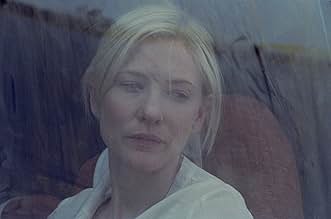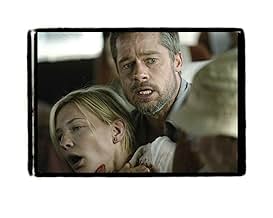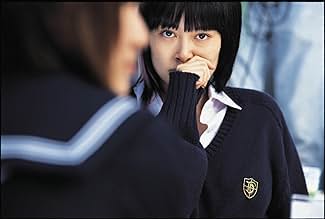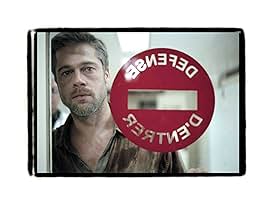Die Tragödie trifft ein Ehepaar im Urlaub in der marokkanischen Wüste und berührt eine ineinandergreifende Geschichte mit vier verschiedenen Familien.Die Tragödie trifft ein Ehepaar im Urlaub in der marokkanischen Wüste und berührt eine ineinandergreifende Geschichte mit vier verschiedenen Familien.Die Tragödie trifft ein Ehepaar im Urlaub in der marokkanischen Wüste und berührt eine ineinandergreifende Geschichte mit vier verschiedenen Familien.
- 1 Oscar gewonnen
- 45 Gewinne & 137 Nominierungen insgesamt
Empfohlene Bewertungen
The film opens in the Moroccan desert: an elderly tribesman trades a high-powered rifle to a goat herder for 500 diram & a goat. He hands the rifle to his two young sons and tells them to kill jackals with it, to protect the herd. As practice, the start shooting at rocks, a car passing on the hill below, and finally a bus. That's the only thing they manage to hit, putting a bullet through the shoulder of a tourist. In the middle of nowhere, there's no medical help, and no one wants to wait with the injured person except her husband. That's the setup of this complex, challenging film. It splits into four related stories, one in Japan, two in Morocco, and the last in California, where a housekeeper has to get to her son's wedding in Mexico, but has no one to watch the two children in her care. She decides to take them along, and of course things go sour. A good cast, great acting, fine cinematography, and expert direction make this film well worth watching. It's not for everyone, but for people who are ready to see deliberately paced low-key thriller, this is one good film. The split story line is reminiscent of "Syriana," but in no way copies it.
"Babel" centers on several groups of people in 4 countries that are all connected by one freak accident
Alejandro González Iñárritu takes us from North Africa to North America to Asia
His film exposes four unconnected story lines that are eventually divulged to be inextricably linked to one another
The first involves an isolated family of goat herders who live in the High Plateaus of the Moroccan desert where two young boys are testing a rifle's range handed by their father to protect their goats from jackals...
The second concerns a Middle-class American couple on a bus tour of Morocco trying to save together their damaged marriage
Meanwhile, in the US, there is grave danger for an undocumented immigranta Mexican nanny as she tries to return to United States after she wrongfully decides to take her two blonde-haired young charges to her son's wedding across the Mexican border, despite her employers' sudden change of plans, that needs that she remains with them and miss the joyful occasion
And on the opposite side of the world, we follow, in Tokyo, an alienated, confused deaf and mute teenage student, recovering from her mother's suicide, who eases her feelings of depression and loneliness by trying to win the friendship or attention of every man or adolescent who crosses her path She flirts with sexual exhibitionism to attract the attention of her distant and uncommunicative father
"Babel" tries to make a point and the point is that when people can't or won't communicate, unpredictable paths can lead to tragic consequences It also tries to leave a message of how a 'shooting' from a simple 'gift' can set off a chain reaction of tragic events in three continents and four countries over which the different characters have exceedingly uncomfortable human emotion
Out of the entire cast, it is only Rinko Kikuchi as Chieko who steals the movie especially when she transmits to her friends her mad decision of sexual aggressiveness, saying to all: "Now they're going to meet the real hairy monster." This scene remembered me, in some way, Sharon Stone uncrossing legs in "Basic Instinct."
The first involves an isolated family of goat herders who live in the High Plateaus of the Moroccan desert where two young boys are testing a rifle's range handed by their father to protect their goats from jackals...
The second concerns a Middle-class American couple on a bus tour of Morocco trying to save together their damaged marriage
Meanwhile, in the US, there is grave danger for an undocumented immigranta Mexican nanny as she tries to return to United States after she wrongfully decides to take her two blonde-haired young charges to her son's wedding across the Mexican border, despite her employers' sudden change of plans, that needs that she remains with them and miss the joyful occasion
And on the opposite side of the world, we follow, in Tokyo, an alienated, confused deaf and mute teenage student, recovering from her mother's suicide, who eases her feelings of depression and loneliness by trying to win the friendship or attention of every man or adolescent who crosses her path She flirts with sexual exhibitionism to attract the attention of her distant and uncommunicative father
"Babel" tries to make a point and the point is that when people can't or won't communicate, unpredictable paths can lead to tragic consequences It also tries to leave a message of how a 'shooting' from a simple 'gift' can set off a chain reaction of tragic events in three continents and four countries over which the different characters have exceedingly uncomfortable human emotion
Out of the entire cast, it is only Rinko Kikuchi as Chieko who steals the movie especially when she transmits to her friends her mad decision of sexual aggressiveness, saying to all: "Now they're going to meet the real hairy monster." This scene remembered me, in some way, Sharon Stone uncrossing legs in "Basic Instinct."
I loved "Amores Perros" It was revolutionary in so many ways and smelled like the real thing even if I couldn't quite put my finger as to what the real thing really was. "21 Grams" had gigantic intentions and superb performances but didn't feel quite revolutionary because we had kind of seen it before - and better - in "Amores Perros". Now "Babel" and, my goodness, the first thing that comes to mind is, what an extraordinary filmmaker Inarritu really is. I suspect that his universe, even if it feels infinite, it is framed - beautifully so - between the walls of biblical references. His methods may be way ahead of the times but the roots are as ancestral as fire itself. I'm not sure where I want to go with all this but the question is, Inarritu is taking me places and that's what I long for in a filmmaker. He's not taking any of us for granted and I'm very grateful for that. His movies are experiences and I for one can't wait for the next one.
4 tenuously connected stories, beautifully shot, admirable soundtrack, and competent acting and directing. But, psychologically, philosophically, sociologically meaningful? Perhaps in their individual stories? But as a whole, I for one cannot connect the dots in this one.
Different people, different races, socio economic classes, cultures, countries, oh, and of course languages, hence communication. A lot of them making really stupid decisions, one in each tale, giving rise to tension and drama in each. Rich or poor, east or west, weak or strong, everyone is prone to just doing the wrong things at times.
It was a decent watch, even given the over bloated running time. If it affected you? Then you have understood the directors language I guess.
Different people, different races, socio economic classes, cultures, countries, oh, and of course languages, hence communication. A lot of them making really stupid decisions, one in each tale, giving rise to tension and drama in each. Rich or poor, east or west, weak or strong, everyone is prone to just doing the wrong things at times.
It was a decent watch, even given the over bloated running time. If it affected you? Then you have understood the directors language I guess.
a film. many stories. great actors. Babel has the gift to be more than a film. or giving a story. or proposing characters. it is a sort of manifesto. about the roots of every day reality. about the price of success, happiness, love, sacrifices, victories, sadness. and that did it a sort of poem. about its public more than about the evolution of characters. a film about mark of gestures. about decisions and believes and science to accept the truth. it is not easy to define it. because entire film is in the space of the frame of the last scenes. a film about ordinaries people. in a labyrinth. as parts of labyrinth. looking the second chance. or, more exactly, the essence of freedom against yourselves.
Wusstest du schon
- WissenswertesThe scene where Chieko (Rinko Kikuchi) and her father are in the car together was shot without filming permission from the city due to slow Japanese bureaucratic procedures. The crew created "man-made" busy traffic, and began shooting the scene. Later the police started chasing them while still shooting the scene.
- PatzerAfter the wedding, Amelia, her nephew and the Jones children use the Tecate border crossing to reenter the USA. After fleeing, we are shown a sandy, wide desert where they wander. Actually, the Tecate border crossing is in the mountains, there is no such desert within a reasonable distance on the USA side. What is shown looks like an Arizona border crossing.
- Zitate
Mike Jones: My mom said Mexico is dangerous.
Santiago: [in Spanish] Yes, it's full of Mexicans.
- SoundtracksPara Que Regreses
El Chapo
Gabriel Ramirez
Maximo Aguirre Music Publishing, Inc.
D Disa Latin Music, S. de R.L. de C.V
Top-Auswahl
Melde dich zum Bewerten an und greife auf die Watchlist für personalisierte Empfehlungen zu.
Details
- Erscheinungsdatum
- Herkunftsländer
- Sprachen
- Auch bekannt als
- Tháp Babel
- Drehorte
- Produktionsfirmen
- Weitere beteiligte Unternehmen bei IMDbPro anzeigen
Box Office
- Budget
- 25.000.000 $ (geschätzt)
- Bruttoertrag in den USA und Kanada
- 34.302.837 $
- Eröffnungswochenende in den USA und in Kanada
- 389.351 $
- 29. Okt. 2006
- Weltweiter Bruttoertrag
- 135.330.835 $
- Laufzeit2 Stunden 23 Minuten
- Farbe
- Sound-Mix
- Seitenverhältnis
- 1.85 : 1
Zu dieser Seite beitragen
Bearbeitung vorschlagen oder fehlenden Inhalt hinzufügen


































